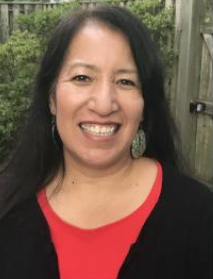Archaeologist Dorothy Lippert (Choctaw Nation of Oklahoma) has been named the Smithsonian National Museum of Natural History’s new repatriation program manager. Lippert is a leading figure in the field of Indigenou archaeology. She is the first woman and first Native American to hold this position.

“We are proud to announce Dorothy Lippert’s appointment to lead the museum’s repatriation program,” said Kirk Johnson, the Sant Director for the National Museum of Natural History. “Dorothy’s range of experience and prominent standing in her field make her a perfect fit for this vital position.”
Lippert has been a tribal liaison in the museum’s repatriation office for more than 20 years. She has worked extensively with tribes from the Southeast and Southwest United States and with Alaska tribes.
“As a tribal citizen, repatriation work is challenging on a personal level, but it is also rewarding to use my archaeological expertise in service to Indigenous communities,” Lippert said. “This is hard work, but I am comforted by the thought of the people we’ve been able to help return home.”
In addition to her duties at the Smithsonian, Lippert has participated in many of anthropology’s most esteemed organizations. These include membership on the boards of directors for the Society for American Archaeology and the World Archaeological Congress as well as service on numerous committees for both organizations. In 2011, she was appointed by President Barack Obama to the Advisory Council on Historic Preservation, serving two terms as an expert member and chair of the Archaeological Subcommittee and vice chair of the Committee on Native American Affairs.
Established in 1991, the museum’s Repatriation Office has pioneered a collaborative process in which Smithsonian staff work with Native American, Alaska Native and Native Hawaiian tribal representatives to determine the disposition of culturally affiliated remains and objects at the museum.
Lippert now oversees a team of several tribal liaisons and other researchers that help the field, review and fulfill repatriation requests for human remains and sacred objects in the museum’s collection.
Lippert is also a prolific scholar exploring subjects ranging from the archaeology of the Southeastern U.S. to the development of Indigenous archaeology worldwide. She has published articles in journals such as American Antiquity, American Indian Quarterly, The American Journal of Biological Anthropology, The International Journal of Cultural Property and Archaeologies as well as chapters in numerous books. Universities and museums worldwide have invited Lippert to serve as a lecturer on repatriation, archaeological ethics and other topics.
She presented on the Smithsonian’s ethical returns program as a featured speaker at the Association on American Indian Affairs’ annual repatriation conference earlier this past week in Shawnee, Oklahoma.
More Stories Like This
Chickasaw Lighthorse Police Officer named Indian Country Law Enforcement Officer of the YearIndian Gaming Association Rallies Broad Coalition Against Sports Event Contracts It Calls Illegal Threat to Tribal Sovereignty
Navajo Resources and Development Committee Issues Notice on Livestock Inspection Requirements
American Prairie, Tribal Coalition Files Protest Over Rescinded Grazing Rights
Northern Cheyenne Push Back Against Trump Administration’s Effort to Alter Little Bighorn History
Help us defend tribal sovereignty.
At Native News Online, our mission is rooted in telling the stories that strengthen sovereignty and uplift Indigenous voices — not just at year’s end, but every single day.
Because of your generosity last year, we were able to keep our reporters on the ground in tribal communities, at national gatherings and in the halls of Congress — covering the issues that matter most to Indian Country: sovereignty, culture, education, health and economic opportunity.
That support sustained us through a tough year in 2025. Now, as we look to the year ahead, we need your help right now to ensure warrior journalism remains strong — reporting that defends tribal sovereignty, amplifies Native truth, and holds power accountable.
 The stakes couldn't be higher. Your support keeps Native voices heard, Native stories told and Native sovereignty defended.
The stakes couldn't be higher. Your support keeps Native voices heard, Native stories told and Native sovereignty defended.
Stand with Warrior Journalism today.
Levi Rickert (Potawatomi), Editor & Publisher


